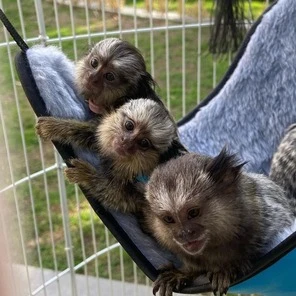Proper care is essential for the health and happiness of your finger monkey. Below are the key aspects of finger monkey care that every owner should understand.
Average Size
4-6 inches (10-15 cm)
Average Weight
3-5 ounces (85-140 g)
Average Lifespan
12-16 years in captivity
A balanced diet is crucial for your finger monkey's health. Their diet should consist of:
Feed your finger monkey 3-4 small meals daily, with the last meal given at least 2 hours before bedtime. Always provide fresh, clean water.
Never feed chocolate, caffeine, alcohol, or high-sugar foods to your finger monkey. These can be toxic and cause serious health issues.
Finger monkeys require certain supplements to maintain optimal health:
Finger monkeys require a specialized environment that mimics their natural habitat while ensuring safety and enrichment.
Regular cleaning is essential for your finger monkey's health:
Preventative care is essential for maintaining your finger monkey's health and detecting issues early.
Symptoms: Sneezing, nasal discharge, labored breathing, lethargy
Prevention: Maintain proper temperature and humidity, avoid drafts
Symptoms: Diarrhea, lack of appetite, weight loss, lethargy
Prevention: Proper diet, clean food and water, regular parasite checks
Symptoms: Weakness, hair loss, abnormal behavior, bone issues
Prevention: Balanced diet with proper supplements
Monitor these aspects of your finger monkey's health daily:
Emergency Warning Signs
If you notice any of these signs, contact your exotic vet immediately.
Maintain a health journal that includes:

Learn everything you need to know about properly caring for pygmy marmosets, from diet and habitat to socialization and health concerns.
Read More
Discover surprising facts about the world's smallest monkey species, from their unique vocalizations to their specialized diet and social behaviors.
Read More
Explore how these highly social primates organize their family groups and why maintaining their social bonds is crucial for their wellbeing.
Read More
Socialization & Training
Proper socialization is crucial for developing a strong bond with your finger monkey and ensuring they're comfortable in their environment.
Bonding Techniques
Training Basics
Positive Reinforcement
Use small treats, praise, and affection to reward desired behaviors. Never punish or scold.
Target Training
Teach them to touch a target stick, which can then be used to guide them to different locations.
Recall Training
Train them to come to you when called using a consistent command and reward system.
Potty Training
While not fully possible, you can encourage them to use specific areas by observing their habits.
Socialization Timeline
First Week (Adjustment Period)
Allow your monkey to acclimate to their new environment. Limit handling to 15-20 minutes, 2-3 times daily. Focus on creating a sense of safety and security.
Weeks 2-4 (Trust Building)
Gradually increase interaction time. Offer treats from your hand. Begin basic target training. Allow exploration of a monkey-proofed room while supervised.
Months 2-3 (Bonding)
Your monkey should be comfortable with regular handling. Begin introducing to trusted family members. Establish consistent daily routines for feeding and play.
Ongoing (Relationship Maintenance)
Continue daily interaction. Introduce new enrichment activities. Maintain training consistency. Monitor for any behavior changes that might indicate stress or health issues.
Understanding Behavior
Learn to recognize these common behaviors: